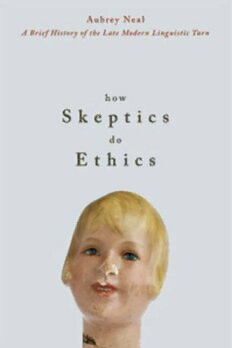Download How Skeptics Do Ethics: A Brief History of the Late Modern Linguistic Turn PDF Free - Full Version
Download How Skeptics Do Ethics: A Brief History of the Late Modern Linguistic Turn by Aubrey Neal in PDF format completely FREE. No registration required, no payment needed. Get instant access to this valuable resource on PDFdrive.to!
About How Skeptics Do Ethics: A Brief History of the Late Modern Linguistic Turn
Enlightenment philosophers are often credited with formulating many theories about humankind & society, & in our post-modern age, we still live with some of the very same compelling, contentious & often unresolved questions about ourselves & the world we live in. Author Aubrey Neal suggests that one of these issues that lingers with us today is scepticism, & in "How Skeptics do Ethics", he unravels the thread of this philosophy from its origins in enlightenment thinking down to our present age. He contends that linguistics & language have not brought modern philosophy any closer to understanding the role & nature of ethics in our current science-based society. Going further, Neal suggests the contemporary reader meets traditional terms for ethical theory, plausible belief & moral action in a different world from the one in which they were coined. Instead, these considerations for modern thinkers require a coherent language practice suitable for the social context in which we live, & thus raise the question of the meaning of old philosophical debates & their value for our society today. Referencing such luminary thinkers as Hume, Kant, & Hegel, Neal seeks to re-ignite age old questions & awaken the reader to a sense that our contemporary modes of reference & understanding should be seen from a substantially different point of view. Challenging, bracing, & entirely unflinching, "How Skeptics do Ethics" is a wake-up call for anyone who thinks seriously about our society, ourselves, & the world in which we live.
Detailed Information
| Author: | Aubrey Neal |
|---|---|
| Publication Year: | 2007 |
| ISBN: | 9781435613287 |
| Pages: | 330 |
| Language: | English |
| File Size: | 1.729 |
| Format: | |
| Price: | FREE |
Safe & Secure Download - No registration required
Why Choose PDFdrive for Your Free How Skeptics Do Ethics: A Brief History of the Late Modern Linguistic Turn Download?
- 100% Free: No hidden fees or subscriptions required for one book every day.
- No Registration: Immediate access is available without creating accounts for one book every day.
- Safe and Secure: Clean downloads without malware or viruses
- Multiple Formats: PDF, MOBI, Mpub,... optimized for all devices
- Educational Resource: Supporting knowledge sharing and learning
Frequently Asked Questions
Is it really free to download How Skeptics Do Ethics: A Brief History of the Late Modern Linguistic Turn PDF?
Yes, on https://PDFdrive.to you can download How Skeptics Do Ethics: A Brief History of the Late Modern Linguistic Turn by Aubrey Neal completely free. We don't require any payment, subscription, or registration to access this PDF file. For 3 books every day.
How can I read How Skeptics Do Ethics: A Brief History of the Late Modern Linguistic Turn on my mobile device?
After downloading How Skeptics Do Ethics: A Brief History of the Late Modern Linguistic Turn PDF, you can open it with any PDF reader app on your phone or tablet. We recommend using Adobe Acrobat Reader, Apple Books, or Google Play Books for the best reading experience.
Is this the full version of How Skeptics Do Ethics: A Brief History of the Late Modern Linguistic Turn?
Yes, this is the complete PDF version of How Skeptics Do Ethics: A Brief History of the Late Modern Linguistic Turn by Aubrey Neal. You will be able to read the entire content as in the printed version without missing any pages.
Is it legal to download How Skeptics Do Ethics: A Brief History of the Late Modern Linguistic Turn PDF for free?
https://PDFdrive.to provides links to free educational resources available online. We do not store any files on our servers. Please be aware of copyright laws in your country before downloading.
The materials shared are intended for research, educational, and personal use in accordance with fair use principles.

